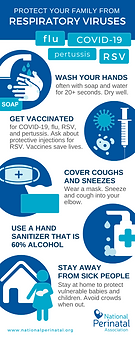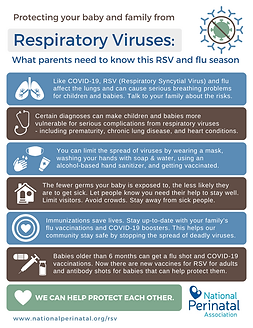
RSV
Respiratory syncytial virus
Cold, flu, and RSV season is here!
Seasonal respiratory infections are spreading in our schools and communities.
This year - as in the recent past - families and providers will need to prepare for the combined threats of:
While have new tools and interventions - including new RSV vaccines for adults (including during pregnancy) and new protective antibody injections for infants - we need to recognize that navigating cold and flu season has become more challenging.
VACCINE HESITANCY IS ON THE RISE.
Now, more than ever, parents and their providers need to build trusting, therapeutic alliances. This means we need to be prepared to address people's concerns and provide parents and pregnant people with the information and support they need to make informed choices.
What's different this season?
In the last couple of years, we've seen exciting developments in vaccination and protection against RSV infection for:
-
infants
-
pregnant people
-
older adults and those with special health considerations
Protecting Infants.
In 2023, the FDA approved a new RSV monoclonal antibody, nirsevimab (brand name Beyfortus™) which provides protection from RSV infection and reduces the severity of RSV disease if you're baby does get sick.
-
See the FDA's full prescribing information.
-
See Nirsevimab Frequently Asked Questions from the American Academy of Pediatrics (AAP)
The CDC has recommended this vaccine for all infants less than 8 months of age during their first RSV season. They also recommend this vaccine for infants up to 24 months with certain medical conditions including chronic lung and cardiac disease as well as immunodeficiency.
See RSV Immunization Guidance for Infants and Young Children
In the past, the monthly monoclonal antibody therapy that was available, Synagis™ (palivizumab), was only available to infants who met certain criteria, including: being extremely preterm and less than 6 months old during their first RSV season or vulnerable because they were receiving medical treatment for bronchopulmonary dysplasia or had hemodynamically significant congenital heart disease.
When compared to Synagis™, Beyfortus™:
-
is less expensive
-
can be given once during RSV season
-
is available at no cost for certain children through the Vaccines For Children (VFC) program
Nirsevimab, like Synagis™, does not trigger the infant’s immune system like a typical vaccine. Rather, it is an injection of lab-made antibodies that provides passive immunity by targeting a protein which allows the respiratory syncytial virus (RSV) to infect cells.
-
Learn more about active immunity and passive immunity.
While Synagis™ lasts only 28 days, and requires monthly injections, nirsevimab lasts up to 5 months. So babies only need to get one dose during the RSV season.
NOTE from the AAP: Children who receive nirsevimab should not get palivizumab. However, if your child did not get all doses of palivizumab, they may be eligible for nirsevimab. Children who received palivizumab in their first season can get nirsevimab in their second season if they are eligible.
NEW If you're pregnant.
Pfizer’s new bivalent RSVpreF vaccine (Abrysvo™) is the first respiratory syncytial virus (RSV) vaccine for pregnant people that protects both them and their newborn from severe RSV illness.
The CDC recommends seasonal administration of one dose of RSV vaccine for pregnant people during weeks 32 through 36 of pregnancy.
See RSV Vaccine Guidance during Pregnancy
“This is another new tool we can use this fall and winter to help protect lives,” said CDC Director Dr. Mandy Cohen. “I encourage parents to talk to their doctors about how to protect their little ones against serious RSV illness, using either a vaccine given during pregnancy, or an RSV immunization given to your baby after birth.”
To prevent RSV-associated lower respiratory tract infections (LRTIs) in infants, the CDC recommends either:
-
administering RSVpreF (Abrysvo™) vaccine during pregnancy
or
-
administering RSV monoclonal antibody, nirsevimab (Beyfortus™) to the infant after birth
NOTE: Most infants will not need protection from both products.
RSVpreF (Abrysvo™) should be administered during weeks 32 through 36 of pregnancy (i.e., 32 weeks 0 days through 36 weeks 6 days). In most of the continental United States, the vaccine should be administered from September through January.
In order to empower patients and promote shared decision-making, pregnant people and their providers should talk about the benefits of vaccination during pregnancy and the decision whether to get vaccinated now to provide immunity to their newborn or to give their baby protective antibody shots after they're born.
Things You May Want to Consider during Pregnancy:
-
The RSV vaccine gives your baby protection right after birth.
-
If you get the RSV vaccine, there is one less injection for your baby to get after birth.
-
Nirsevimab may provide your baby with longer-lasting protection.
-
It may be hard to get nirsevimab this fall and winter. Your ob-gyn may be able to help you find out if nirsevimab will be available for your baby after birth.



Make a Plan.
Protect yourself and your family this season!
Protecting myself and my baby from respiratory viruses
Protecting my baby and family from respiratory viruses
What families can do.
We know that taking these steps will help us reduce the risks of respiratory infections:
-
If you're pregnant, get vaccinated against RSV - ACOG recommends the Pfizer RSV vaccine if you are 32 to 36 weeks pregnant from September to January. The vaccine creates antibodies that pass to your fetus. This means the baby will have some antibodies to protect them from RSV for the first 6 months after birth. Read about Vaccine Safety During Pregnancy
-
Get your flu shot. Stay up-to-date with your family's immunizations.
-
Stay home when you can.
-
When you have to go out, wear a mask and stay at least six feet apart from people who are not a part of your household.
-
Change your clothes when you get home.
-
Practice good hand hygiene. Wash your hands with soap and water for more than 20 seconds. Use an alcohol-based hand sanitizer when you can't.
We love these resources from Sesame Street in Communities
Understanding RSV

RSV is a really serious virus.
Spread the word - not the infection.
Share this video from the American Lung Association with people you care about.
Recognizing RSV.
Respiratory Syncytial Virus (RSV) is one version of the common cold.
For most healthy children and adults it will cause a slight cough, watery nasal congestion, and mild fever. But for many infants - including babies who were born prematurely or have certain health conditions - RSV can be much more serious and have devastating health consequences.

-
Some babies who get infected with RSV are sick for weeks - and quickly develop bronchiolitis or pneumonia
-
They may wheeze for months - or even years - and can go on to develop chronic lung disease.
-
Because it clogs their airways, many babies cannot get enough oxygen and must be admitted to the hospital for respiratory support.
-
Hospital admissions can last a week or longer.
WATCH: How To Recognize RSV Symptoms: Scarlett's Story
WATCH: Example of Wheezing, Grunting, and Squeaking in Infant in Respiratory Distress
WATCH: Nasal Flaring and Substernal/Subcostal Retractions in Infant
-
The sickest babies may even need to be placed on a breathing machine or heart lung bypass.
-
Tragically, some babies infected with RSV die from its effects.
It may be the common cold for you...
but it can be life-threatening for some babies.

We love these resources from Sobi, the makers of Synagis™ (palivizimab).

RSV is a Troublemaker!
WATCH: General pediatrician Lynn Smitherman, MD, explains how the burden of RSV weighs heavily on babies, children and their families.
How providers can help.
Providers can help reduce the burden of RSV infections in our communities by:
-
Knowing the signs and symptoms of severe respiratory infection
-
CDC: Respiratory Syncytial Virus Infection (RSV) for Healthcare Providers.
-
Infant distress warning signs Watch this video
-
Talking to patients about the benefits of vaccinations during pregnancy.
-
Tracking national data and trends at the CDC's website
-
Educating ourselves about Nirsevimab (Beyfortus) Product & Ordering Information and Nirsevimab Coding & Payment - especially during what will be a challenging in the first year of implementation.
The Dangers of RSV
Neonatologist Vincent Smith, MD, explains why RSV can be dangerous for infants and young children.
Reliable Resources.
-
Up to Date: Patient Education: Bronchiolitis (and RSV) in infants and children (Beyond the Basics)
-
American Academy of Pediatrics (AAP) RSV: When It's More Than Just a Cold español
-
How to Prevent RSV in Adults and Children from VeryWellHealth
NPA's history of advocating for evidence-based care for vulnerable infants.
2022
The National Perinatal Association
supports access to monthly antibody injections of Synagis™ (palivizimab).
See our Evidence-Based Interdisciplinary Collaboration:















